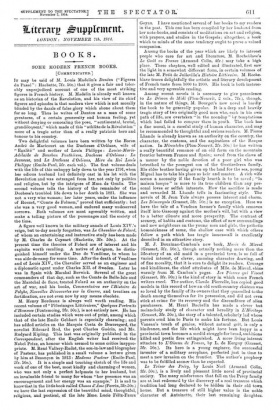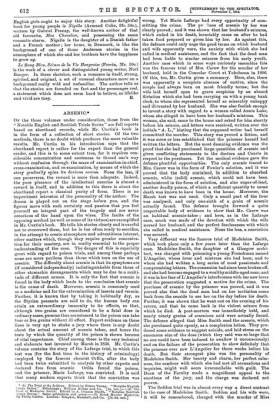BOOKS.
IT may be said of M. Louis Madelin's Banton (" Figures du Passe": Hachette, 7fr. 50c.) that it gives a fair and toler- ably unprejudiced account of one of the most striking figures in French history. M. Madelin is already well known as an historian of the Revolution, and his view of its chief figures and episodes is that modern view which is not morally blinded by the dazzle of false glory which shone about them for so long. Thus be writes of Danton as a man of some greatness, of a certain generosity and human feeling, yet without denying or concealing the pose, "sentimental, brutal, grandiloquent," which made of this "athlete de la Revolution" more of a tragic actor than of a really patriotic hero and honour to his country.
Two delightful volumes have been written by the Baron Andre de Maricourt on the Duchesse d'Orleans, wife of " Egalite" and mother of Louis Philippe : Louise-Marie- Adelaide de Bourbon Penthievre, Duchesse d'Orleans : La Jeunesse, and La Dueltesse d' Orleans, Mere du BIN: Louis Philippe (Emile-Paul, 5fr. each vol.). The first volume deals with the life of this unhappy lady down to the year 1791, when her odious husband had definitely cast in his lot with the Revolution and was estranged from her, not only by politics and religion, but by the intrigues of Mme. de Genfis. The second volume tells the history of the remainder of the Duchess's troubled life down to her death in 1821. She was not a very wise woman; her later years, under the influence of Rouzet, "Comte de Folmon," proved that sufficiently : but the was a very good woman, and endured many undeserved sorrows. Both volumes are most agreeably written, and make a telling picture of the personages and the society of the time.
A figure well known in the military annals of Louis XIV.'s reign, but to-day nearly forgotten, was Le Chevalier de Folard, of whom an entertaining and instructive study has been made by M. Charles de Coynart (Hachette, Mr. 50c.). At the present time the theories of Folard are of interest and his exploits worth recalling. A native of Avignon, he distin- guished himself under the Due de Vendome, to whom he was aide-de-camp for some time. After the death of Vendeme and of Louis XIV., the Chevalier served as an engineer and a diplomatic agent under Charles XII. of Sweden. Later be was in Spain with Marshal Berwick. Several of the great commanders of that day, such as the Comte de Belle-Isle and the Marechal de Saxe, treated Folard as an authority on the art of war, and his books, Commentaires stir l'Histoire de Polybe, Nouvelles Decouvertes stir la Guerre, and treatises on fortification, are not even now by any means obsolete.
M. Henry Bordeaux is always well worth reading. His recent volume of " Pelerinages Litteraires," Quelques Portraits d'Harantes (Fontemoing, 3fr. 50c.), is not entirely new. He has included certain studies which were out of print, among which that of the late Emile Gebhart is especially charming ; and has added articles on the Marquis Costa de Beauregard, the novelist Edouard Rod, the poet Charles Guerin, and Mr. Rudyard Kipling. This last was originally published in the Correspondant, after the English writer had received the Nobel Prize, an honour which seemed to some critics inappro- priate. M. Rene Vallery-Radot, the son-in-law and biographer of Pasteur, has published in a small volume a lecture given by him at Besancon in 1913: Madame Pasteur (Emile-Paul, 2fr. 50c.). It is a simple and touching sketch of the life and work of one of the best, most kindly and charming of women, who was not only a perfect helpmate to her husband, but an invaluable friend to many for whom "her presence was an encouragement and her energy was an example." It is sad to knowthat in the little book called Choses d'..iime (Perrin, 3fr.50c.) we have the last expression of the beautiful mind, thoughtful, religious, and poetical, of the late Mme. Lucie Feltx-Faure
Goyau. I have mentioned several of her books to my readers in the past. This one has been compiled by her husband from her note-books, and consists of meditations on art and religion, with prayers, and studies in the Gospels ; altogether, a book which to minds of the same tendency ought to prove a valued companion.
Among the books of the year which are likely to interest people who care for art and literature, M. Rocheblave's Le Galli en France (Armand Cohn, 4fr.) may take a high place. These chapters, well edited and illustrated, first saw the light in a somewhat different form, in certain volumes of the late M. Petit de Julleville's Histoire Litteraire. M. Roche- blave traces delightfully the artistic and literary development of French taste from 1600 to 1900. His book is both instruc- tive and very agreeable reading.
Among recent novels it is necessary to give precedence to Le Demon de Midi (Plon-Nourrit, 2 vols., 7fr.), though, in the nature of things, M. Bourget's new novel is hardly
the book to be generally popular. It is a deep and heavily tragic story of two originally good men who, each in his own path of life, are overtaken "in the noonday" by temptations which bad failed to conquer them in youth. The book has a fine moral, is a careful study of human character, and may
be recommended to thoughtful and serious readers. M. Pierre
Lhande is already known as an authority on the country, the character, the customs, and the aspirations of the Basque nation. In Mirentchu (Plon-Nourrit, 3fr. 50c.) he has written a really beautiful romance of an old farm on the mountain frontier between France and Spain; saved from the claws of a usurer by the noble devotion of a poor girl who was betrothed to the youngest son of the Gustizederra family. His elder brother having given up the land for the sea, young Miguel has to take his place as heir and master. A rich wife seems a necessity if the family hearth is to be saved ; "la maison basque " is more to its true children than any per- sonal loves or selfish interests. How the sacrifice is made
and rewarded M. Lhande tells in fascinating style. The novels of M. Jean Vole always possess interest and charm.
Les Denzarques (Grasset, 3fr. 50c.) is no exception. Here we have the tale of a Vendean farmer's family which removea itself into Gascony against the mother's will, but with a view to a better climate and more prosperity. The contrast of scenery, of habits and customs, the effect of new surroundings and new neighbours on the young men and girls, the pathetic homesickness of some, the shallow ease with which others follow a path which has tragic issues—all is excellently described in an attractive story.
M. J. Bouzinac-Cambon's new book, Marie de Mireul (Grasset, 3fr. 50c.), though actually nothing more than the life-story of an old maid in a provincial town, is so full of varied interest, of clever, amusing character drawing, and of fine morality, that it is sure to delight its readers. Courage and kindliness, the chief attributes of Mlle. de Mireul, shine
warmly from M. Cambon's pages. Les Pierres qui Vivent (Grasset, 3fr. 50c.) is the kind of story in which some French
writers excel. The author, Claude Pierrelle, has copied good models in this record of how an old south-country clititeau was so loved by the family of its owners that they quarrelled to the death among themselves for its possession, and did not even
stick at crime for its recovery and the discomfiture of alien purchasers. M. Henri Bachelin has made a clever but
melancholy study of character and heredity in L'Heritage (Grasset, 3fr. 50c.), the story of a talented, scholarly lad whose parents send him to Paris to make his fortune. But Louis Vaneau's touch of genius, without natural grit, is only a hindrance, and the life which might have been happy in a provincial town becomes a sordid struggle for Mead, ambitions killed and poetic fires extinguished. A more living interest attaches to L' Oiseau de France, by L. de Kerguy (Grasset, 3fr. 50c.). Its hero is a young engineer, the successful inventor of a military aeroplane, perfected just in time to meet a new invasion on the frontier. The author's prophecy was to be fulfilled sooner than he expected.
Le Tresor des Precy, by Louis Noel (Armand Colin,. 3fr. 50c.), is a lively and pleasant little novel of provincial society. The many misfortunes that fall on the Pricy family are at last redeemed by the discovery of a real treasure which tradition had long declared to be hidden in their old town
house. But a treasure of still higher value is the noble character of Antoinette, their last remaining daughter.
English girls ought to enjoy this story. Another delightful book for young people is Nigelle (Armand Colin, 3fr. 50c.), written by Gabriel Fmnay, the well-known author of that old favourite, Mon Chevalier, and possessing the same romantic charm. Nigelle is the daughter of a Danish father and a French mother ; her home, in Denmark, is like the background of one of those Andersen stories in the atmosphere of which she and her brothers have the happiness to grow up.
Le Sang Bleu, Scenes de fa Vie Hongroise (Perrin, 3fr. 50c.) is the work of a clever and distinguished young writer, Noel Bangor. In these sketches, each a romance in itself, strong, spirited, and original, a set of unusual characters move on a background really wild and unfamiliar. The author tells us that the stories are founded on fact and the personages real, a statement which does not seem bard to believe, so lifelike















































 Previous page
Previous page